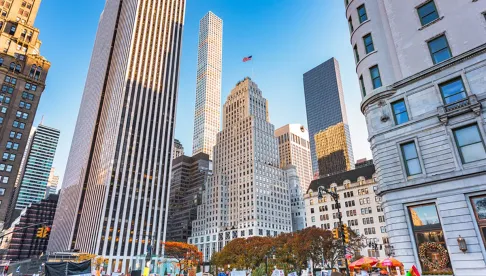On December 15, 2021, New York City followed up on the recently announced vaccine mandate for private employers by releasing further details, including several guidance documents and mandatory signage. The New York City Commissioner of Health and Mental Hygiene (“City Health Commissioner”) issued an Order To Require COVID-19 Vaccination In The Workplace (“Order”), citing authority under Section 556 and 558 of the New York City Charter as well as Section 3.01(d) of the New York City Health Code. The Order requires covered employers to generally exclude unvaccinated individuals from workplaces in New York City starting December 27, 2021.
The guidance documents, which include a summary of the vaccination requirement for workplaces, Frequently Asked Questions for Covered Entities (FAQs), guidance on accommodations for workers, and guidance for employers on equitable implementation of COVID-19 vaccine requirements, among other documents (collectively, “Guidance Documents”), contain notice-posting procedures that will apply to all covered workplaces within New York City. The Guidance Documents also contain a broad definition of covered employers and individuals and outline the Order’s requirements. New York City businesses have just 10 days to comply with the new rules.
Who Is Covered?
All Private Employers Are Covered Entities
The Order defines a “covered entity” as (1) any private entity that employs more than one worker or maintains a workplace in New York City, or (2) any self-employed individual or sole practitioner who works within a workplace or interacts with other workers or the public in the course of doing business. This broad definition includes not-for-profit organizations, non-government agencies, and religious institutions.
The Order’s definitions of “worker” and “workplace” are likewise expansive. Any individual who works in person in New York City at a workplace is covered, whether full- or part-time, paid or unpaid, as an employee, volunteer, intern, or independent contractor. Any place, including a vehicle, where a worker is on the job in the presence of anyone else, whether a co-worker or a member of the public, falls under the Order’s definition of a covered workplace.
A Few Workers Excluded
Explicitly excluded by the Order are any individuals who work remotely “from their own home” and do not interact in person with any co-workers or members of the public in the course of their employment, as well as anyone who may enter a workplace “for a quick and limited purpose.” In addition, the Order does not apply to those non-New York City residents who are performing artists, athletes, or individuals accompanying such performing artists or athletes who do not otherwise have to display proof of vaccination pursuant to Key to NYC rules, guidance for which was updated on December 15.
Notably, the Guidance Documents do not address how they apply to unionized workplaces, and it seems that employers are not granted latitude in implementing the mandate, with the exception of handling individual requests for reasonable accommodations. As such, it appears that employers likely do not have “significant flexibility and/or discretion in implementing” the mandated vaccination policy. As we advised previously, such latitude would trigger a duty to bargain over a change in the terms and conditions of employment under the recent guidance issued by the General Counsel of the National Labor Relations Board. Employers may, however, face bargaining obligations with respect to treatment of requests for accommodation and the status of those who apply for but do not receive accommodations.
Covered entities or individuals who are subject to federal requirements (such as the Occupational Safety and Health Administration’s COVID-19 Vaccination and Testing Emergency Temporary Standard or the Federal Contractor Executive Order 14042, which are not currently in effect because of a court order) must comply with the Order.
What Must Employers Do and by When?
Require Vaccination
By December 27, all workers must either (1) submit proof of at least one dose of a vaccine or (2) request a reasonable accommodation based on a disability or sincerely held religious belief. To comply, all New York City employers must institute a requirement that any workers (including volunteers and interns, as well as those employed by providers of temporary labor) who enter the workplace be vaccinated against COVID-19. Indeed, unlike some government vaccination programs, the New York City mandate does not offer a so-called “vax or test” option under which employees may choose to submit to frequent testing for COVID-19 in lieu of becoming vaccinated. The Order requires those who are not vaccinated or who have not applied for reasonable accommodation by December 27, 2021, to be excluded from workplaces.
Acceptable proof of vaccination includes a CDC vaccine card, Excelsior Pass, Excelsior Pass Plus, a NYC vaccine record, the NYC COVID Safe app, or CLEAR Health Pass. Any worker who presents proof of only one shot of a two-dose series must provide proof of the second dose within 45 days of the date they received their first dose.
Employers must retain records showing compliance with the proof of vaccination requirement. Employers may maintain records of vaccination status in a few ways:
-
Retain a copy of the proof of vaccination (to comply with the Americans with Disabilities Act (ADA), this must be maintained in a separate confidential medical file);
-
Review proof of vaccination and create a log containing:
-
Worker’s name,
-
Whether the worker is fully vaccinated,
-
For workers who submitted proof of the first dose of a two-dose vaccine, the date by which they can provide proof of a second dose (no later than 45 days after the first dose), or
-
Record of any reasonable accommodation with supporting documentation; or
-
-
Review proof of vaccination each day as the person enters the workplace.
Employers that have already reviewed and logged employees’ proof of vaccination do not have to re-engage in this exercise but will need to collect proof of vaccination from new hires. Employers are not required to check proof of vaccination of individual contractors who have third-party employers (e.g., cleaning staff, IT contractors onsite), so long as the contractors’ employers confirm proof of vaccination.
Complete and Post Attestation
Employers are also mandated to comply with new notice posting requirements. New York City’s Department of Health and Mental Hygiene (DOHMH) has created a one-page attestation sign that employers must fill out and post in a public location at each of their workplaces within New York City by December 27, 2021. This attestation must be posted even if the employer maintains its own signage about employee vaccination status. However, if employers previously posted the “Key to NYC” notice requirements for restaurants, fitness centers, and entertainment venues, they do not need to post the additional DOHMH attestation sign. An additional optional poster has also been released.
Handling Requests for Reasonable Accommodations
Workers who have a sincerely held religious belief (not a social or political belief) or a medical condition or disability that prevents them from being vaccinated may apply for a reasonable accommodation pursuant to Section 6 of the Order, and must do so by December 27, 2021. According to the guidance, workers may be permitted to continue coming into the workplace while their reasonable accommodation requests are being evaluated.
Evaluating Requests and Reasonable Accommodation Checklist
The City released a reasonable accommodation checklist, available on page 2 and 3 of the Guidance on Accommodations for Workers document, which (according to the City Health Commissioner) will demonstrate that the employer handled the reasonable accommodation request appropriately if followed, and kept on file. The checklist addresses religious and medical accommodations separately and includes boxes laying out examples of when an accommodation may properly be granted under various scenarios.
Additionally, the checklist suggests accommodations that may be offered, including weekly PCR testing, remote work, or leaves of absence, and suggests that accommodations might not be granted when the unvaccinated worker poses a direct threat to themselves or others or presents an undue burden on the employer. Importantly, the checklist details the City’s interpretation of what fails to constitute a valid religious accommodation request, including the following:
-
The government should not force people to get vaccines or interfere with medical decisions.
-
This vaccine is not safe or ineffective.
-
COVID-19 is a hoax.
Additionally, the checklist suggests that some requests may constitute valid sincerely held religious beliefs, including the following:
-
The worker has explained/documented how the belief requires the worker not to be vaccinated. (The worker stating that they practice a religion is not enough on its own, and although a clergy letter is not required, it is helpful and persuasive when the clergy is someone who has a personal relationship with the worker, as opposed to a form letter from “out of town” clergy, which is not).
-
The worker has not taken other kinds of vaccinations previously, and, if they have, explains why those vaccines were not against their religion.
-
The worker says a religious belief prevents them from allowing certain substances to enter their body and explains other commonly used medicines, food/drink, or other substances that they do not allow to enter their bodies.
-
The worker says they cannot take the vaccine because it was developed and/or tested using fetal cells that the worker is concerned may have been the result of an abortion, and the workers does not take medications such as ibuprofen (Advil), acetaminophen (Tylenol), or any other medications similarly developed or tested using fetal cell derivative lines.
While the City has indicated that these are the factors to consider in evaluating whether these are sincerely held religious beliefs, we expect challenges to such positions. The list of factors does not appear to be approved by the City Commission on Human Rights.[1]
Employers may deny a reasonable accommodation request that imposes an undue burden on the employer. The FAQs provide examples of accommodations that are likely to pose a direct threat per the guidance as accommodations that would allow an unvaccinated employee to engage in a high-risk activity, such as yelling or exercising, while in close proximity to others, or to work in close proximity to high-risk individuals.
Recordkeeping
Additionally, employers are required to keep a record of any reasonable accommodation. The FAQs document provides that if any workers remain unvaccinated because of an approved reasonable accommodation based on their religion or medical condition, the employer must maintain a record consisting of:
-
when the employer granted the accommodation,
-
the basis for granting such accommodation, and
-
any supporting documents the worker provided.
None of the guidance specifies whether such information should be kept confidential, but to the extent that such records contain medical information, employers should maintain them separately from other personnel records as required under the ADA. As detailed above, the checklist will demonstrate that the employer handled the reasonable accommodation request appropriately if followed and kept on file.
Enforcement and Penalties for Noncompliance
According to the Guidance Documents, inspectors from various City agencies will begin enforcing the Order on December 27, 2021, and all inspectors, no matter which agency they are from, will be inspecting for compliance with the same requirements.
Although the Guidance Documents provide that the goal is to educate and work with businesses to help them achieve compliance, if a business refuses to comply, it would be subject to a fine of $1,000 and escalating penalties thereafter if violations persist.
Finally, we would note that we are aware of at least one law firm that is currently soliciting class members for a challenge to the City’s vaccine mandate.
What New York City Employers Should Do Now
New York City employers should take the following steps to ensure compliance with the new requirements:
-
Assess current policies and practices with respect to vaccination requirements for employees. Many employers—whether subject to a mandate, such as the New York State regulations for health care providers, or based on independent decisions, already require vaccination against COVID-19 as a condition of employment. New York City employers already requiring workers to be fully vaccinated to enter the office do not need to “reinvent the wheel,” but policies that do not cover volunteers or interns may require adjustment to comply with the City Health Commissioner’s Order.
-
If vaccination status data has not been gathered, advise employees that New York City is requiring all workers—including volunteers and interns—to submit proof of at least a first dose of a COVID-19 vaccine to their employer by December 27, 2021. Workers who come to the office and are unvaccinated must make arrangements to either receive a vaccine or submit a request for a reasonable accommodation by that time.
-
If worker vaccination status has not yet been collected, create a process to collect and maintain this information from employees, as suggested above or using another method that complies with the confidentiality requirements of federal law. The information must be collected by December 27, 2021, along with any requests for reasonable accommodation.
-
Keep records of your efforts to comply with this mandate, as its enforcement can be authorized by any New York City agency, and noncompliance can result in escalating fines, starting at $1,000.
-
Conspicuously post a completed Affirmation of Compliance in each of your workplaces within New York City by December 27, 2021.
-
While we recommend taking steps towards timely compliance, keep an eye out for any forthcoming challenges to New York City’s vaccine mandate.
[1] Moreover, we note that the New York City Human Rights Law requires that employers consider reasonable accommodation requests based on a disability, sincerely held religious belief, pregnancy, or status as a victim of domestic violence, stalking, or sex offenses. The City Health Commissioner’s guidance focuses on religious and disability accommodation requests to the vaccine mandate.







 />i
/>i


